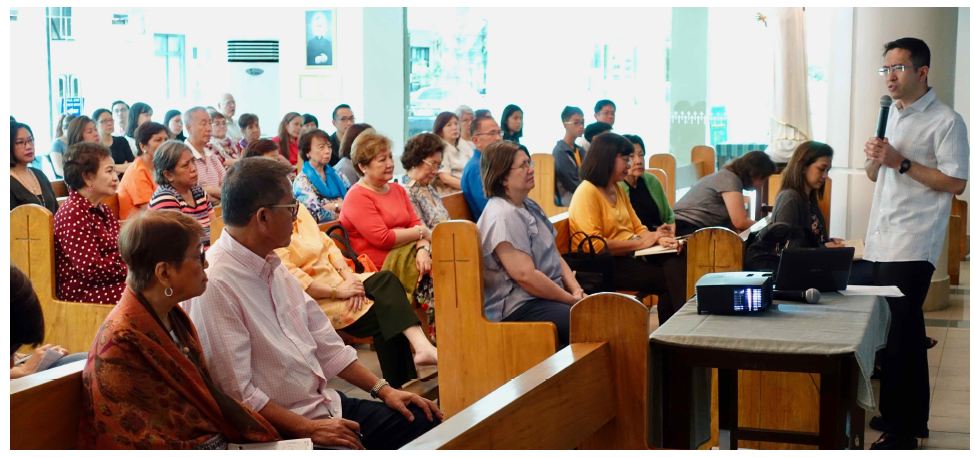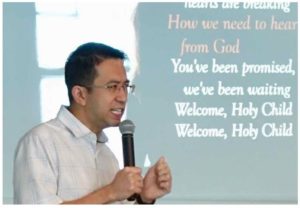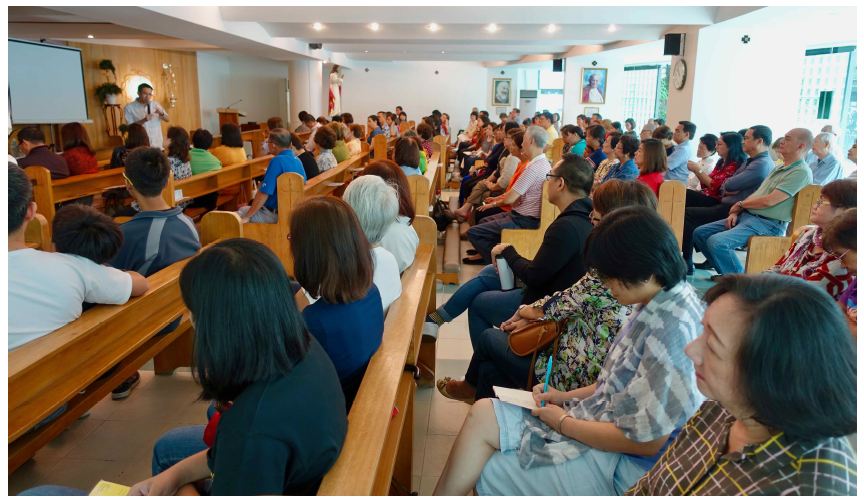‘Have a Vulnerable and Defiant Christmas!
 Christ the King Parish had its Advent Recollection, ‘Christmas Has Two Faces’, last December 9 at 10 am at the Divine Mercy Chapel, led by Fr. Francis Alvarez, SJ. Fr. Francis was ordained in 2009, completed his Licentiate in Sacred Theology with a concentration in Scripture in 2013, and then completed his Doctorate in Theology and Education from Boston College just this year. In 1997, Fr. Francis was awarded ‘Ten Outstanding Students of the Philippines’. He finished his AB Philosophy degree from the Ateneo de Manila University in 1999, graduating magna cum laude and batch valedictorian. He then finished his MA Philosophy in 2002, then completed his Bachelor’s in Sacred Theology from the Loyola School of Theology, summa cum laude, in 2009, and was class valedictorian. For his doctorate, he focused on how to teach Scripture to the faithful today.
Christ the King Parish had its Advent Recollection, ‘Christmas Has Two Faces’, last December 9 at 10 am at the Divine Mercy Chapel, led by Fr. Francis Alvarez, SJ. Fr. Francis was ordained in 2009, completed his Licentiate in Sacred Theology with a concentration in Scripture in 2013, and then completed his Doctorate in Theology and Education from Boston College just this year. In 1997, Fr. Francis was awarded ‘Ten Outstanding Students of the Philippines’. He finished his AB Philosophy degree from the Ateneo de Manila University in 1999, graduating magna cum laude and batch valedictorian. He then finished his MA Philosophy in 2002, then completed his Bachelor’s in Sacred Theology from the Loyola School of Theology, summa cum laude, in 2009, and was class valedictorian. For his doctorate, he focused on how to teach Scripture to the faithful today.
Fr Alvarez began his talk with the image of the Roman god, Janus, with his two faces, to point out his theme, that Christmas has two faces.
 He asked the audience several questions: Though Advent is supposed to be the season for waiting, have you really been waiting for God this Advent season? When you review this past year, how many times did you need God, if ever? Were there days when you couldn’t have survived the day without God’s help? Or has pride prevented you from admitting you needed God? Is God just an extra, to be called when we’re desperate for help?
He asked the audience several questions: Though Advent is supposed to be the season for waiting, have you really been waiting for God this Advent season? When you review this past year, how many times did you need God, if ever? Were there days when you couldn’t have survived the day without God’s help? Or has pride prevented you from admitting you needed God? Is God just an extra, to be called when we’re desperate for help?
Fr. Francis asked everyone to reflect on their life actions, plans and projects that came to fruition and met with success. Then he asked if we thought we were successful because we gave it our 100%, or did we not exert any effort and asked God to do 100%, or if we thought it was a 50%-50% effort, or if it was 99% us and 1% God, or 99% God and 1% us. The right answer, he said, was – success came because you gave it your 100% and you asked God to give his 100%. He alluded to Matthew 11:30 with the passage – ‘for my yoke is easy and my burden is light’. He explained that oxen, the original beasts of burden, always worked in pairs, so a ‘yoke’ meant that two oxen shared in the load, which is what happens in our lives, where God shares our burden by being the other ox in the yoke.
For the first ‘face’ of Christmas, which is a Christmas of vulnerability and weakness, he focused on Chris Rice’s song, “Welcome to our World”. Instead of singing Happy Birthday to Jesus on Christmas, Rice sings instead ‘Welcome to our world’.
Fr. Francis argued that the country, and the world, is in a mess, what with the senseless violence, extra judicial killings, sexual harassments, the Marawi siege, the political crises in Israel, North Korea, etc. Like the gracious guest who, though announced, finds the host scrambling to get everything in order, God tells us: “You don’t have to sweep the dirt under the rug or hide the embarrassing junk in the closet. The reason I have come is you. If it is a messy you that I find, then I will enter your messiness and help you straighten up the mess. I only ask that you make room for me – even if it is only a manger. In you, I will make my home.” This is why Chris Rice is encouraged to invite this God deeper into himself:
Bring Your peace into our violence Bid our hungry souls be filled Word now breaking Heaven’s silence Welcome to our world.
But we ask – if things are already messy, why did God come in fragility, as a baby Jesus born in a manger? Would not the world’s woes be better addressed with imperviousness and toughness – perhaps by a mighty warrior or a powerful king leading a formidable army? Would it not have been more efficient if God just came swooping down like a great big ball of fire from heaven to burn away all that is evil in us and purify us from all sin?
Fr. Francis provided the answer – because living in a messy chaotic world makes us vulnerable. And by showing us his own vulnerability as a tiny baby in a manger, we open up to him and become intimate with him. God comes in weakness because He desires our love. Attraction to someone much more powerful can be motivated by selfish interests. But being drawn to someone weak can only be love.
Fr. Francis advises – this Christmas, and throughout the New Year, let us welcome weakness into our world. When we stand with those whose tears are falling, whose hearts are breaking – as Chris Rice’s song began – we will be more in touch with our need for God.
Chris Rice ends his love song to God:
So wrap our injured flesh around You Breathe our air and walk our sod Rob our sins and make us holy Perfect Son of God Welcome to our world.
So we welcome the Lord God this Christmas with the words, ‘Have a Vulnerable Christmas’.
For the ‘other’ face of Christmas, which is a Christmas of ‘de?iance’, Fr. Francis used as a peg the poem ‘Christmas Bells’ by Henry Wadsworth Longfellow. He recounted that Longfellow heard the church bells ringing, and he wrote:
I heard the bells on Christmas Day Their old, familiar carols play And wild and sweet the words repeat Of peace on earth, goodwill to me!
But how could Longfellow write about peace and goodwill when, two years earlier, his wife Fannie had died due to injuries she suffered when her dress accidentally caught ?ire and then the following year, he received news that his son was seriously injured and paralyzed after fighting in the American Civil War. So he wrote:
And in despair I bowed my head; “There is no peace on earth,” I said; “For hate is strong, And mocks the song Of peace on earth, good-will to men!”
How can we greet each other “Merry Christmas”, given the darkness outside and inside us? But, Fr. Francis argued, Christmas does not end in despair. It ends with care. It does not end with heads hung low and heavy hearts. It ends with peace. Henry Wadsworth Longfellow realized this, too. And so he wrote:
Then pealed the bells more loud and deep: “God is not dead, nor doth He sleep; The Wrong shall fail, The Right prevail, With peace on earth, good-will to men.”
Outside, it is dark. But still, we hang these tiny twinkling lights all around us – not bright enough for us to see that far ahead, but bright enough for people of faith to be reminded that in the midst of darkness, there can still be light. And Light has conquered the world. We need a defiant faith to celebrate what seems like a dark and dismal Christmas season. We need to be able to defy our own darkness, our many deaths, and our distrust and say, “There is light. There is life. There is love.” We need to be able to ring with the bells more loud and deep and proclaim, “God is not dead nor does he sleep. The Wrong shall fail, the Right prevail, with peace on earth good-will to men!”
The best way to greet each other this season is not with “Have a merry Christmas” but with “Have a defiant Christmas!

